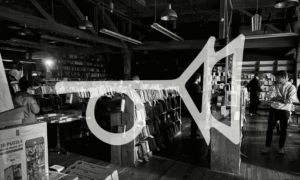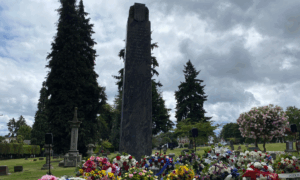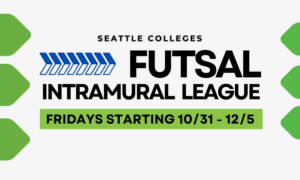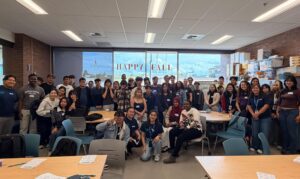On Oct. 26, 2023, Seattle Central hosted a college-wide community program titled “Burden of Proof: Wards Cove v. Atonio, a Bittersweet Landmark Supreme Court Case.” The session, moderated by Professor Tracy Lai, featured a distinguished panel of five experts: David Della, Nemesio Domingo, John Foz, Paul Ryan Villanueva, and Conor Casey. The event marked the culmination of Lai’s dedicated research on a legal case involving employment discrimination against non-white workers (predominantly Filipinos) in Alaskan salmon canneries.
Tracy Lai: Laying the Groundwork
The program commenced with Lai recognizing October as National Filipino American History Month. Lai described the commemoration as the earliest documented presence of Filipinos in the United States in 1587 — highlighting the deep and enduring historical significance of Filipinos in the country.
Lai continued to illustrate the scale of the salmon canning industry in Alaska, emphasizing the role of major corporations.
“When there is big money at work, you know the stakes are going to be high, and we always have to ask ourselves, ‘Where did the big money come from?’ We are going to hear how directly it came off the backs of the [cannery workers],” Lai said during the event.
These workers — the main subject of the research — are known as Aleskeros, Filipinos following seasonal work in Alaska.
Broadening the context before the panelists’ remarks, Lai delved into what she calls “The Long Road to the Supreme Court.” She explained that the research encompasses perspectives from the cannery floor, the experiences of organizing as Alaska Cannery Workers Association (ACWA), the impact on the union, LELO (Legacy of Equality, Leadership, and Organizing), labor archives research at the University of Washington, as well as curriculum development and the ongoing fight for justice, particularly in the context of the Wards Cove v. Atonio case.
David Della: First-Hand Experience
Della was the first panelist to speak. Employed as a cannery worker at Wards Cove Packing Company from 1972 to 1974, he served as a union official and Secretary-Treasurer at ILWU Local 37. He played a pivotal role as a class member plaintiff in the Wards Cove v. Atonio class action lawsuit. Della said that in the Filipino and broader Asian communities, it was akin to a rite of passage for individuals, primarily males, to become employed within the Alaska salmon canning industry — a tradition that he, too, was a part of.
Shortly after he arrived at the canneries, it became glaringly apparent that there was overt discrimination against Filipino workers, particularly in the type of work they were assigned: the most “dangerous, coldest, lowest paying jobs,” with no opportunities to move up and out of those conditions. Segregation was not limited to the workplace; it permeated every aspect of their lives, including living spaces, meals, and mail. There was also an unspoken but clearly defined boundary that restricted movement within the cannery grounds, with most areas being off-limits to Filipino workers.
Second and third-generation Alaskeros had conversations with their elders who, despite the harsh working conditions, felt they had no choice due to the lack of alternative job opportunities. Frustrated with the situation, the younger generation, often called the “young Buffalo,” began to push back. The older generation preferred not to challenge the status quo, but they supported the younger generation’s efforts to bring about change, encouraging them to take the lead. This set the stage for lawsuits against three major canning companies, including Wards Cove Packing Company, in the 1970s.
The Alaska Cannery Workers Association (ACWA) was established by Alaskeros to build legal cases and community support. Recognizing the systemic nature of discrimination, they knew that legal action alone would not suffice. Della said, “[we] could not fight the fight for a practice that was built systematically… we had to match that type of discrimination with an organizing effort.” They saw the need to strengthen the union, which had been weakened by corruption and industry influence. Hence, in the mid-1970s, they launched a reform movement, ILWU Local 37, led by Silme Domingo and Gene Viernes. This parallel approach of legal action and union reform was necessary, and even those initially hesitant — the older generations — eventually joined the cause, forming a united front against deeply ingrained systemic practices.
Nemesio Domingo: Legal Underpinnings
Domingo, the second panelist, explored the organizing efforts undertaken by ACWA and LELO, the landmark Wards Cove v. Atonio case, and the reconstruction of civil rights.
Domingo elaborated on the inception of LELO, a collaborative endeavor of three influential labor organizations: the Alaska Cannery Workers Association (ACWA), the United Construction Workers Association (UCWA), and the United Farm Workers (UFW). Domingo also covered the origins of the three legal battles against the Alaskan canning industry.
All three legal actions were built upon a shared basis, namely the 1964 and 1866 Civil Rights Acts, as well as the concept of disparate impact. This concept refers to practices that may not appear discriminatory on the surface but have the effect of excluding specific individuals. Domingo believes the Supreme Court took the Wards Cove v. Atonio case with the intent of looking at the issue of disparate impact.
In the case, Domingo highlighted a shift in the burden of proof by the Supreme Court. This shift required workers not only to pinpoint discriminatory practices but also to demonstrate that the employer’s practices, leading to disparate impacts, were non-essential for business operations. This change had far-reaching implications, primarily because companies possess ready access to relevant documents and resources. Furthermore, their track record of implementing these practices placed them in a more advantageous position to establish the existence of legitimate job necessities for practices that incidentally affected minority workers. In 1989, the Supreme Court struck down the Wards Cove v. Atonio case.
In response to the case, U.S. Congress passed the Civil Rights Act of 1991. This act was considered a victory for advocates of disparate impact, which means that certain practices may unintentionally discriminate against certain groups. However, there was a notable price to pay in the form of excluding the Wards Cove plaintiffs from its benefits. Civil rights progress was made through the act, but it came at the expense of the approximately 2000 plaintiffs in the Wards Cove case.
“There have been two constructions and two deconstructions of civil rights in this country…and what happens now is looking at a way to do a third reconstruction,” Domingo explained. “As we go forward, in terms of a third reconstruction, we need to frame civil rights as part of a human rights agenda.”
John Foz: The Impact
John Foz, the third panelist, worked as a cannery laborer for two seasons in 1979 and 1980. During his testimony, Foz elucidated the far-reaching, albeit uneven, consequences of the cases. Legal actions compelled companies to control damage and undertake extensive rebranding efforts to counteract the negative attention. Regarding the workers, the improvements in both the quality and quantity of food provided only marginally exceeded the standard expected in typical factory workplaces. Simultaneously, the overall living conditions experienced a nominal upgrade, making them habitable and bearable for the labor force.
Foz found the influence of the union transformative. Following the reform movement, the Union embraced the slogan “organize the unorganized.” The strategic shift ushered in a wave of organizing campaigns and a renewed emphasis on member education and shop steward training, which had been neglected for decades. In addition, they reintroduced locally-based labor studies courses, underlining the union’s commitment to empowering and educating its members.
Foz concluded that the historical abuses of the Alaska cannery industry were really “a David and Goliath saga,” one characterized by a significant power imbalance, much like the biblical story. A situation where a smaller or weaker party (David: Cannery workers) faces significant challenges and obstacles posed by a much larger and stronger opponent (Goliath: Companies). This metaphor implies that the workers or smaller entities in the Alaska cannery industry faced substantial hardships and injustices when confronting the powerful and dominant forces of the industry.
Paul Ryan Villanueva: Empowering History
Villanueva, the fourth panelist, is a recent graduate of the Evans School of Public Policy & Governance, actively contributing to APALA’s Seattle chapter. He is also a dedicated member of the LELO History Project, which is committed to preserving the firsthand narratives of the pioneers within the organization.
During the discussion, Villanueva emphasized acknowledging the contributions of Filipino Americans in the struggle for civil rights. Their efforts for equal rights, though not widely covered in traditional education, are a living part of recent history, having transpired just 50 years ago, he says. Villanueva stressed the necessity of directly hearing from those who were part of this history rather than relying on interpretations that can sometimes lead to the erasure of crucial historical details.
“[we should] find ways and think about the ways we can empower Filipino American history [through the] Wards Cove [case],” Villanueva said.
Conor Casey: Learning More
Casey, the final panelist to address the audience, holds the position of Head of Labor Archives at the University of Washington, Seattle. He oversees the community-supported and knowledge-rich archives, which are dedicated to preserving and sharing the history of labor in the Pacific Northwest. Casey provided an array of resources accessible through an online link. It includes documents, photographs, and oral histories all directly related to the Wards Cove v. Atonio case.
A Call to Action
“[From history] there is so much that we can still, and should, and need to learn from…If we want to protect our civil and labor rights, a human rights framework is certainly worth the fight…There have been so many struggles that have already brought us to this point, so no stopping now.”
Lai’s words serve as a compelling call to action, reminding us that the lessons drawn from the past must guide our future endeavors. The torch of justice, kindled by the sacrifices of those who came before us, must continue illuminating our path as we press forward.
Author

Danika is an aspiring journalist based in Seattle. Born and raised in Jakarta, she has long been drawn to the gravity of stories—the way they hold what might otherwise slip through the day. As editor-in-chief, she approaches her work with curiosity more than certainty, trusting small details to reveal larger truths. For her, storytelling is less about control than attention: a practice of listening closely and noticing what remains after the noise.







Be First to Comment